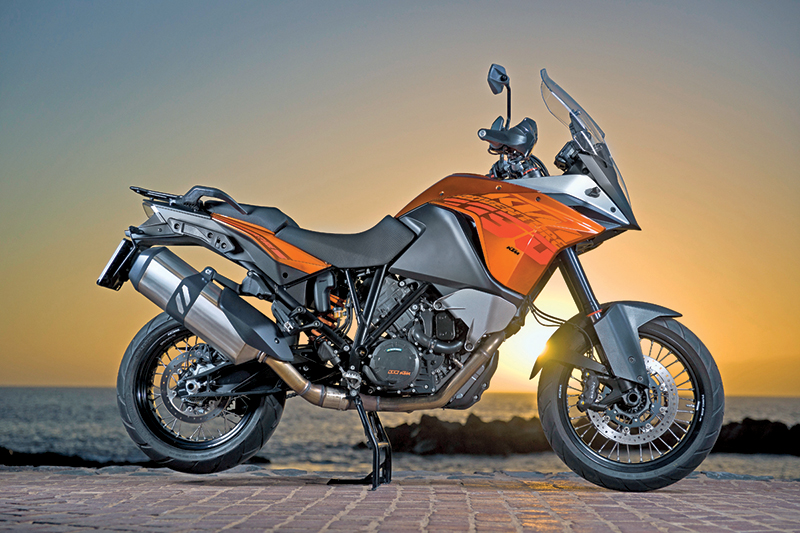2014 KTM 1190 Adventure

First Ride Review
Roaring out of the fourth tight, uphill corner, one of hundreds in our aggressive ascent from sea level to the lava fields surrounding 12,198-foot Mount Teide, two things dawned on me. One is that Tenerife, the largest of the 13 Canary Islands situated off the northwestern coast of Africa, is a beautiful but challenging place to ride. The other is that the all-new KTM 1190 Adventure is light-years beyond its predecessor.
After winning the Dakar Rally in 2002 with its LC8 950R, KTM launched a production version for 2003 called the 950 Adventure. With angular, rally-racer styling and a potent 942cc 75-degree V-twin, it quickly established itself as the most off-road-ready of the big-bore adventure tourers. Displacement was increased to 999cc for 2006 and, over the course of a decade, more than 40,000 950/990 Adventures were produced.
Nowadays, with the ADV segment brimming with high-tech bikes like the BMW R 1200 GS, Ducati Multistrada 1200, Triumph Tiger Explorer and Yamaha Super Ténéré, having a powerful engine, strong chassis and trick components doesn’t cut the mustard. Fully integrated electronics—riding modes, traction control and ABS—are the name of the game, along with pushbutton-adjustable suspension, customizable ergonomics and a high level of refinement. The new 1190 Adventure has all of this and more, thanks to 120,000-plus man-hours of work by 180 engineers—the most intensive development project in KTM’s history.
Rather than start from scratch, KTM adapted the 1,195cc LC8 V-twin from its RC8 superbike—an engine that has been produced and refined for five years—for adventure touring duty. The DOHC cylinder heads have four valves and two spark plugs per cylinder, with separate ignition mapping for each spark plug to ensure optimal combustion. The retuned engine makes a claimed 150 horsepower and 92 lb-ft of torque—dead even with the Ducati Multistrada 1200 (Rider, January 2013), the reigning horsepower champ in the class. Even though the engine is larger and more powerful, fuel economy is said to be 20 percent better than that of the 990 Adventure. Power is sent to the rear wheel through a 6-speed transmission with a new slipper clutch and chain final drive rather than a heavier shaft.
As with most bikes in this segment, the Adventure’s throttle valves are controlled electronically, with sensors, algorithms and wires replacing the previous model’s mechanical cable. And like other manufacturers, KTM claims its system maximizes engine performance and efficiency. Joining the throttle-by-wire club allowed KTM to grace the new Adventure with multiple riding modes—Sport, Street, Rain and Off-road—which offer varying levels of engine output, throttle response and traction control (TC). The TC system was developed by Bosch, as was the new combined anti-lock braking system, which offers two modes (Street and Off-road). Purists, of course, can turn off TC and ABS.
Those who just can’t get enough button pushing can add the new optional electronic damping system (EDS), built by WP Suspension. EDS offers four preload settings (solo, solo with luggage, two-up and two-up with luggage) and three damping settings (Comfort, Street and Sport), though, oddly, not a dedicated off-road setting. Four buttons on the left handlebar and an LCD panel to the left of the tach make it a breeze to change riding mode, TC, ABS and EDS settings. The more I ride bikes with fully integrated electronics, the more I appreciate their convenience and adaptability.
No stone was left unturned when redesigning the new Adventure. The steel trellis frame weighs just 21.6 pounds, the cast aluminum swingarm has a lattice design for added strength and the patented tubeless spoked wheels are now in 19-/17-inch sizes, foregoing the less street-friendly 21-inch front on the previous model. They’re shod with special Continental TrailAttack 2 tires that were developed in conjunction with the Adventure, in 120/70-19 front and 170/60-17 rear sizes. Further enhancing user-friendliness, front and rear suspension travel has been reduced from 8.3 inches to 7.5 inches.
Nearly every contact point between the bike and rider can be adjusted—brake and clutch levers, footpegs, handlebar and seat—and quick-release levers allow the windscreen to be repositioned. High-quality details are everywhere, from the standard steering damper to the LED running lights and turn signals, from the removable rubber inserts in the cleated footpegs to the standard luggage rack that’s predrilled for the accessory top box. The styling now has more curves and fewer sharp edges, broadening the Adventure’s appeal beyond those who recite rally statistics in their sleep.
Two days of climbing up, down and around the mountains of Tenerife, on narrow roads lined with unforgiving guard rails, concrete blocks and razor-sharp volcanic rock, gave me a solid feel for the 1190 Adventure’s improvements and capabilities. KTM has made the bike better in almost every way—more powerful engine, lighter clutch pull, slicker transmission, better handling, better braking performance and more comfortable ergonomics. The superbike-derived RC8 engine can be rowdy, with lots of vibration and noise at high revs, but it purrs peacefully at touring speeds. The lack of cruise control, firm seat and chain final drive, not to mention the excellent Brembo brakes with radial front calipers and radial master cylinder, reaffirm KTM’s “ready to race” philosophy. Increased fuel capacity—6.1 gallons, up from 5.2—should give the new Adventure good range, and its claimed wet weight is just 507 pounds.
The good news is that the all-new 1190 Adventure raises the bar in the extremely competitive open-class adventure touring segment. MSRP is $16,499 and it should be in U.S. dealerships in October.
